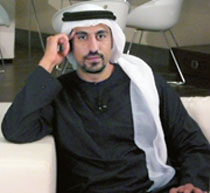IF you switch on your TV around 15 minutes (Makkah time) before iftar, you would find Ahmad Al-Shugairi discussing issues relating to Saudi society in a constructive and critical way. Al-Shugairi is known through his previous work on the youth awareness program Yalla Shabab.
For the third year on the trot, he is presenting Khawater 3 (Thoughts 3) to reach out primarily to the youth and also people of other ages. He talks about the empty half glass, believing that someday it will be entirely filled.
Every episode reflects the daily-lived reality of life in the Kingdom. Al-Shugairi discusses issues relating to Arabian culture and how it was once the world’s most acclaimed, the issue of beggars, and the issue of Saudi youth traveling abroad and how they fail to broaden their views by not going to museums and learning about the culture of the country they visit.
Al-Shugairi explained that his ideas stem from what he reads and his own personal observations in society. Members of the program’s production team also suggest ideas for some episodes.
A 12-minute-episode takes around 30 hours to prepare. This includes executing the idea, and filming and editing it until it finally appears on TV. In fact some ideas are scrapped for various reasons. “Ever since the first season, I have wanted to do an episode on washing the dead, but it is difficult to find a family who would agree to show their loved ones being washed on TV,” he said.
Every year, Al-Shugairi does one episode on death, which he tries to do in an unusual and special way that viewers find touching.
The first season of Khawater was called Khawater Shab (A Young Man’s Thoughts). Episodes were five minutes long and appeared just before maghrib prayers in Makkah. Episodes in the second season were seven to eight minutes long and the word “shab” or “young man” was removed from the title to ensure the program reaches out to all ages.
One of the things that are special about this year’s season is the intro (title) that has been graphically designed on a computer. It shows different scenes representing different ideas in rapid succession. In one of the scenes, a group of scholars from different Islamic schools of thoughts can be seen talking and discussing religious issues near a mosque. When the call for prayer “Athan” begins they all respond and go for prayer united by one religion. The opening introduction itself took around four months to make.
“The topics discussed this year are bolder than previous years. Issues I discussed this year, like discrimination in Saudi Arabia against other nationalities and religious schools, are strong. There is also an episode about Muslim unity in looking for the Ramadan and Eid Al-Fitr crescents,” said Al-Shugairi.
Khawater is now being planned as an annual Ramadan show and Al-Shugairi is currently working on other programs to feature on TV outside Ramadan. He believes that as long as people accept Khawater then it will last. “I’m glad that the program speaks the minds of people of different ages, including children as young as 11 and elderly folk in their 50s,” he said.
The program is now being played on both MBC and Al-Risalah. Censorship in both channels differs. Al-Risalah, for example, cuts scenes that have music, while MBC cut a scene that involved Sunnis and Shiites in a racism episode entitled “Natana” (stink), a word used by Prophet Muhammad (peace be upon him) to describe racism.
In the ninth episode, Al-Shugairi wandered the streets riding a horse as he couldn’t find a car made in an Islamic country. He wanted to use all products manufactured in Islamic countries in that episode but had diffuculties in finding them. He used the horse instead of a car and trotted around Andalusia, the coffee shop that he owns in Jeddah, in full glare of the public.
The Khawater team filmed in both Saudi Arabia and Egypt. It started shooting here in May and in Egypt in June.
Al-Shugairi said that shooting a series takes longer than the previous series. Khawater Shab 1 took only two weeks to prepare. This year’s episodes took the longest to prepare because the ideas are cutting edge and took longer to research. “It’s harder to think of reinvent your ideas than to start with a brand-new idea. We’ve covered 90 topics so far. It’s harder every year to find new topics that weren’t discussed before. There are many topics that are being discussed, but knowing how to present them in a different and attractive way is difficult,” said Al-Shugairi, adding, “I hope that the youth act upon what they see and try improving themselves.
Al-Shugairi released a book called “Khawater” last year, which is independent and unrelated to the episodes. The book is about self-improvement.
The first series of the program is available on DVD. The second will be in the market by the end of Ramadan and the third will be released after Ramadan. DVDs are available in all major bookstores, including Jarir and Obeikan. The Khawater team is also considering whether to include English subtitles on the DVD versions of their episodes. Iqra will air the second season with subtitles after Ramadan.










